Review-Roundup: ACCA 13-Ku Kansatsu-Ka 02/03, BanG Dream! 01, Idol Jihen 03
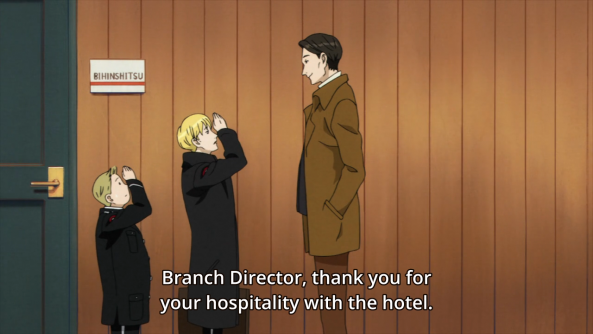
The fact that the 13 provinces seem to have these surreal quirks only makes the series more interesting.
This time I review:
ACCA 13-Ku Kansatsu-Ka 02/03: Imagine a ton of elite in a room while “Everybody Wants to Rule The World” from Tears For Fears is playing and they’re all staring at the one guy who seemingly doesn’t want anything to do with ruling anything. Jean’s that guy and he’s in deep trouble…
BanG Dream! 01: So, what do you hear when you look at the stars…? What, you hear nothing? Well, that’s a problem because this one girl can and because of that she… Well, see, here’s the thing: She finds these star-stickers one day and yeah, what I said about the stars… it’s a whole thing. It’s basically everything for her and it turns out when she listens to the stars they didn’t mention what she should do. No, it took those stickers (remember those?) to lead her to a guitar that’s shaped like a star – because it is, I mean, OF COURSE, it is! Running almost immediately to a local music-store with her guitar she happens to watch a band perform. It’s a truly transformative experience for this high-school-student! … who I guess has never heard music before or seen a live-concert.
Idol Jihen 03: An island has the perfect society by annually being drowned by cats and devoting their entire infrastructure to the moodswings of cats. But one day the cats disappear. And since it’s the local politician’s fault (because, of course, it is!) idols have to come and fix things. Turns out the way to fix things involves a prophecy, an ancient ritual and the casual admission that Shintoism is VERY real. But as long as people are happy who cares how fantastical things get, right?
ACCA 13-Ku Kansatsu-Ka 02/03 Review:
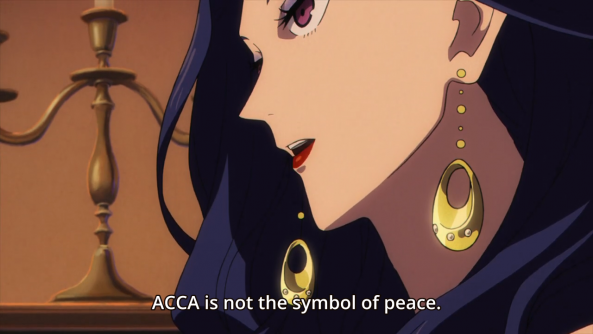
It’s interesting to see how different characters have different opinions of what ACCA is about. There isn’t really this one ideal everybody believes in.
I hadn’t realized this when I reviewed the first episode but this series is based on a manga-series by Natsume Ono who also wrote Ristorante Paradiso and House of Five Leaves. Both these series shine in their character-work and it’s through the depth of its characters it can carry its more laid-back tone. Natsume’s series usually aren’t afraid of quiet moments because that’s where the series has the space to unfold the nuances of its cast. Also, in terms of genre Natsume’s work has offered some good variation so far because rather than stereotypes it’s Natsume’s style of characterization (and how it gets explored) that defines his work.
The second episode pretty much is just as much an introduction to the series as the first one. Jean’s role as inspector gets introduced again and the cast gets re-introduced. In terms of world-building both episodes have a few little exposition-y moments where you learn about the role of ACCA, the 13 provinces and its relationship to its king. But the only thing you really need to be aware of is that ACCA is a public organization that keeps law and order as well as provide public services (like healthcare and firewatch) and Jean is part of the watchdogs that’s supposed to make sure no corruption happens. In those first two episodes you can easily see the path to a procedural format. After all, each of the 13 provinces is different (surreally so as the second episode shows with its “Everything’s bigger here.”-gimmick). Jean would just go around and get involved in some trouble.
Where the series immediately deviates from what you’d expect is in how Jean is characterized. It’s a great choice of characterization to have a character that nobody can figure out be the center of attention despite his intentions. His stoic attitude makes Jean just as enigmatic to us as to the characters around him. When he’s being suspected of being part of the rebellion, you actually can’t say for sure what his true intentions are. Nobody can figure him out and the audience is right there alongside the characters. It almost seems too good to be true that he’s just this down-to-earth-guy who does his job well but has no ambitions at all. And his smoking is the perfect symbol of his detachment from society’s expectations as well as their understanding. There isn’t anybody who actually knows why he smokes. Everyone’s just baffled by his choice to smoke.
With the second episode the series introduces another interesting facet to another character. Jean’s best friend Nino is actually a spy for ACCA and has been tasked to investigate Jean. At the same time, though, the second episode quickly resolves the sub-plot between Jean and Rail. I mean, Rail has some made-up grudge against Jean and plans to frame him for some incident. But the frame-job never materializes. Instead, Jean quickly finds out thanks to Nino that Rail has the lighter. And so what happens instead is a rather mature dialogue. The characters come to an understanding without some overblown dramatic incident and this quiet moment ends up humanizing Rail instead of making him some petty antagonist. It’s a style that really gives the series a very thoughtful atmosphere.
So, after the second episode I think it’s a good series with a high potential to be entertaining. I figured that the whole rebellion-thing and Jean’s involvement would be left for the series-finale and until then we would get episodic adventures. What the third episode does instead, though, is to kick the series into high-gear and take all of its plot-elements to the next level. The third episode expands the cast, raises the stakes and broadens the scope of the series. The series has become at least ten times more ambitious after the end of the third episode.
It started with Nino’s hidden role as spy but the third episode really emphasizes the political-intrigue-element of the show. Alone the scene between Mauve and Jean and afterwards the scene between Nino and Jean: Just pay attention to how they deal with the wine. It’s noticeable that both Mauve and Nino want him to get drunk when they want something from him. This sort of nuance is exactly how those quiet moments become bearable.
Another interesting element of the third episode is how honest it is about its characters’ intentions. The prince wants to abolish ACCA, Grossular wants ACCA to rule with absolute authority, Mauve wants to establish order and the king with his advisor also have their own agenda. And they’re obviously all on collision-course with each other and Jean is right at the center of the whole thing.
The episode fittingly ends with Jean who has just heard what trouble he’s in by just showing him take a longer drag from his cigarette than usual. That’s how you end an episode! Ideally, I guess, you would want this explosive moment like that in your first episode rather than your third but still… It’s an amazing episode in how it sets up multiple factions conspiring against with each other with a protagonist who gets caught in the middle. And what holds it all together is characterization. Not action, not some abstract, intellectual concept and not any cheesy melodrama: It’s all about who’s involved rather than what happens.
Episodes-Rating: 2nd episode 7.5/10 3rd episode 8.5/10
BanG Dream! 01 Review:
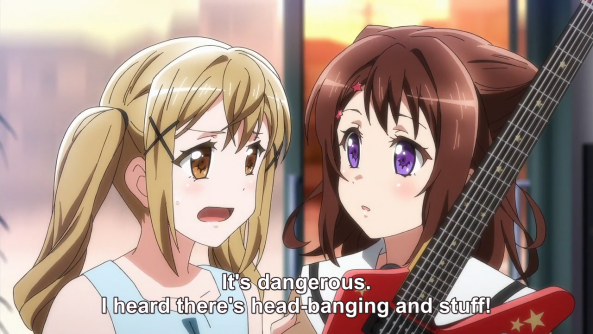
It’s 2017! Who the hell would put such a ridiculous line into this series? And isn’t it ironic how it turns out that some pop-girl-band is playing there and only girls are in the audience…? There’s nothing remotely dangerous or threatening about this place or the people in it!
If you look at how the episode begins and how it ends, you might make the assumption that this is just another series that wants to follow in K-ON’s footsteps. Cute girls, school-life, a band and a cheesy sort of moe-sentimentality: It’s all there. What this short summary doesn’t tell you is how mind-numbingly empty this episode feels and how the main-character is a truly insane person that acts without rhyme or reason. Watching this episode lets you experience the incredible mix of inhuman artifice combined with a heavy dose of cluelessness.
The episode finishes with the main-girl finding her way to music and being inspired to take an interest in it. I can’t tell you why that happened because it makes no sense. The visuals from the beginning are tied to the scene at the end while the main-girl’s narration actually relates to a flashback from the middle of the episode that defines her character. What this means is that a character that has no interest in music suddenly shows an interest in it because it reminds her of something that has nothing to do with music. If that sounds non-sensical to you, then that’s because it is.
It’s hard to imagine a less non-sensical symbol for the series’ themes than the “starbeat”. After all, there isn’t a single character in this episode who can explain what this even means. The younger sister even corrects the main-girl thinking she’s just talking about their heartbeats. If you remove the veneer of a happy-go-lucky moe-band-series, then you’re left with something truly weird. There’s something deeply troubling about a character talking about hearing “the beats of the stars” while nobody else can and how this strange belief seems to guide her life in unexpected ways. The star-stickers leading her to a star-shaped guitar comes quite close to magical realism actually. There’s no logical way to explain the character’s behavior or how these events could be linked like this.
Then again, the main-girl is utterly insane. I get it, moe has cultivated the idea of truly stupid girls symbolizing cuteness and purity in some fashion but this series takes this one step further by frankly pushing the main-girl into autistic territory. Her social inaptitude is troubling to say the least but in addition to that, there are multiple moments in this episode where she seems to lack any sort of self-awareness or common sense. Like, when she’s running around with her newfound guitar to the local music-store and bluntly declares that she wants to learn music. That’s the behavior of a kindergarten-kid who lacks social awareness and experience. Even beyond this troubling aspect, it also means that it’s quite hard to actually empathize with her struggle to find meaning in her life. The bar she has to cross is SO low that it’s frankly amazing how in spite of that, the series has still failed to achieve even that. Her love for music is as spontaneous and insane as everything else she does in this first episode.
Another thing that’s truly amazing about this episode is its casual relationship with time and pacing. This episode has a montage-sequence for NO reason! It just shows that the main-girl has been unable to find anything that piques her interest despite her testing out many clubs. In fact, this episode has achieved the dubious honor of spending most of its time on truly nothing. There’s a scene in the middle of the episode for example where the main-girl has just left Karaoke with her new friends and coincidentally runs across the bakery of the girl she befriended on her first day. She immediately begs for a chance to work there. Nothing comes of it and instead the friend just wishes her good luck in finally finding something that she really wants to do. In one way, the series wants you to think of the main-girl wanting to find meaning as this urgent desire/quest she pursues but at the same time, the episode wastes SO much time on nothing happening that it creates a very laid-back atmosphere. Entire days pass in this episode without resolution and the episode doesn’t treat it like the stakes are getting raised because of that. It’s like the main-girl has all the time in the world to finally find that one thing she wants to do.
As a first episode, this is truly a failure on every level. It’s weird, it’s crazy and it’s childish in the strangest ways. And what’s worse: The premise of the series is entirely unoriginal and uninspiring. The worst-case-scenario for a series such as this one should be forgettable mediocrity but this episode has actually managed to be even worse than that!
Episode-Rating: 3.0/10
Idol Jihen 03 Review:
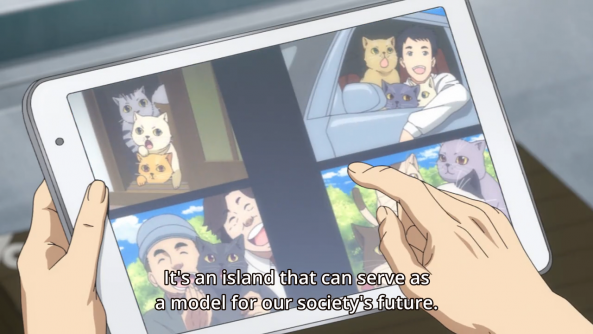
How is cat-overpopulation pushed by some divine entity a model for society’s future…?
It’s easy to dismiss a series like Idol Jihen. The premise is absurd and what the series has done with it so far has been equally ridiculous. So the easy answer would be to just dismiss a series like this one as stupid shit. After three episodes, though, it’s interesting to see that there’s a method to this madness. This series’ craziness is far from random and it reminds me of the few virtues last season’s Shuumatsu no Izetta for example had. Someone clearly did try to salvage something from the stupidity of this series but they didn’t realize how futile their attempts would turn out to be. Or maybe they’re already in crazy-town and think they actually did make this series better.
What’s most baffling is that the series uses its idols-as-politicians-premise to push a ultra-conservative and populist agenda. I already mentioned in my last review how the series approaches its populist angle: Poor people living in an agrarian society in the countryside who all seem to be virtuous vs. corrupt, selfish, rich politicians. Additionally, the series is SO conservative it devotes this third episode to religion.
Now animes are no strangers to the Shintoistic ideals of harmony, ie that everything is part of the natural order (even magic – which means that it isn’t exactly ‘supernatural’) and ideally you strive for a sense of balance and oneness. It’s the 21st century and this episode has one character openly declare that a good course of action to resolve a problem is to go to various shrines and pray. And nobody flinches once things are starting to get a little weird. Instead, the episode portrays faith and religion as something that’s VERY real and at the core of society (and thereby also ignores the fact how much this deviates from reality). This episode straight-up wanders into fantastical territory and acts like it’s the most natural thing of the world.
Already the idea of the cat-island is SO fantastic, you gotta suspend your disbelief to take an interest in that concept. Add to that an immortal boss-cat, a prophecy and a ritual for good measure and what you’re left with is something that has nothing to do with politics or the struggles of idols. It’s actually interesting how the series seems to conflate its traditional elements with what the idols are doing. After all, there’s no traditional precedent to take idols that seriously. This is the ONLY element where the series deviates from its conservative point-of-view. Other than that, the series relies on fantastical storytelling to solve the situation.
At the same time, though, the premise of the series wants you to think about it in terms of politics and usually you don’t conflate that with more fantastical elements (unless it’s a straight-up fantasy-series). Due to that, the question of how self-aware this series is becomes an issue. There’s no question about how ridiculous this series is but at that point the series either ends up being banal or allegorical. And what’s probably the most interesting aspect of the series is that you can make a case for either. Despite its ridiculousness, this series has been fairly consistent so far in what its message is and what its characters represent. On the other hand, though, you can certainly argue that the series’ idea of politics is quite simplistic and surreal.
The episode introduces another idol-party as well with the Starlight-party. But where the Sunlight-party is pretty easy to figure out, this is less the case with the characters from the Starlight-party. The characterization is gimmicky and their most defining moment in the episode is their faith. But this is probably the biggest problem this series has: Its characters are boring. Some are more amusing than others (Shizuka’s conflict is appropriately ridiculous, for example) but overall, the series’ character struggle to make a mark as individuals instead of just becoming plot-devices for the conservative point of view at the heart of the series. There’s nothing cathartic about seeing Natsuki succeed. Her only problem is failure and the series has now spent three entire episodes telling the audience that she’s great. That doesn’t make for compelling drama, of course.
It will be interesting to see how popular this series is gonna be and how much it’s gonna resonate with Japanese people. The idea of the country-side as this place of purity filled with upstanding citizens while established politicians are greedy, selfish losers does show that the show is pushing for a certain message. And yet, the series is constantly undermining that message with ridiculous plot-points and one-note characters. It isn’t a good series but its weirder elements make it an interesting watch, I’d say.
Episode-Rating: 5.5/10
Random Thoughts:
- Originally I had wanted to review Youji Senki as well because that’s quite an absurd series as well. But at the end of the third episode it declared that the main-character would go to school now… Yep, that old chestnut… *sigh* Let’s see how the series handles that.
- You know, overpopulation of any kind is a problem and it’s especially a problem on an island. And didn’t have the politician a genuine grievance against the cats? Because the religious worship led to a preferential treatment of the cats while she as a human had to hunger. How do you just explain away that grudge?
Posted on January 26, 2017, in ACCA 13-Ku Kansatsu-Ka, Anime, BanG Dream!, Idol Jihen, Reviews and tagged ACCA 13-Ku Kansatsu-Ka, ACCA13区監察課, ACCA: 13-Territory Inspection Dept., Adventure, Anime, BanG Dream!, Idol Incidents, Idol Jihen. Bookmark the permalink. 1 Comment.









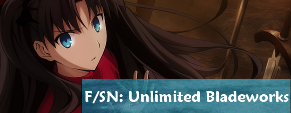







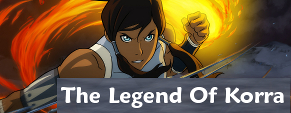
I was interested in ACCA from episode 1, but episode 3 has definitely consolidated it as a must watch for me this season. I just hope if manages to deliver on the story it seems to be promising.
Thanks for sharing your thoughts.
LikeLike